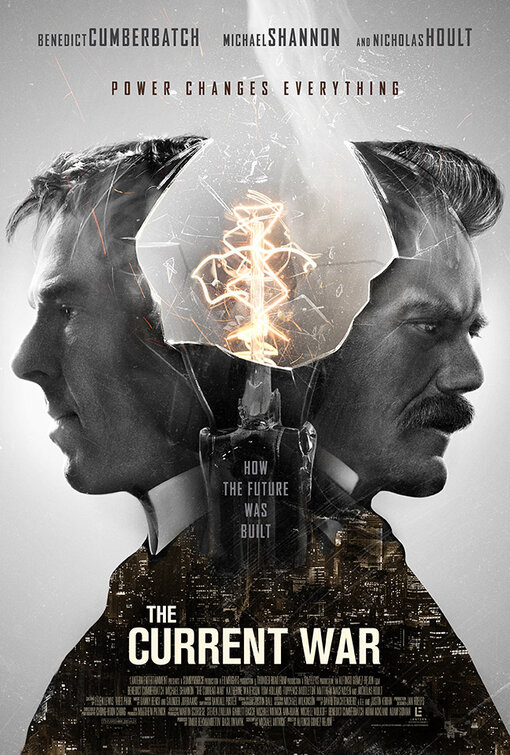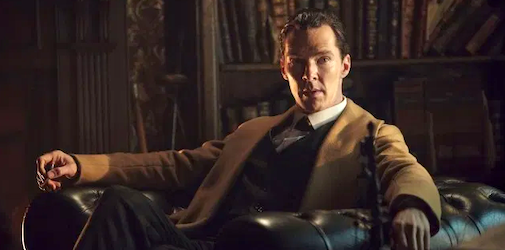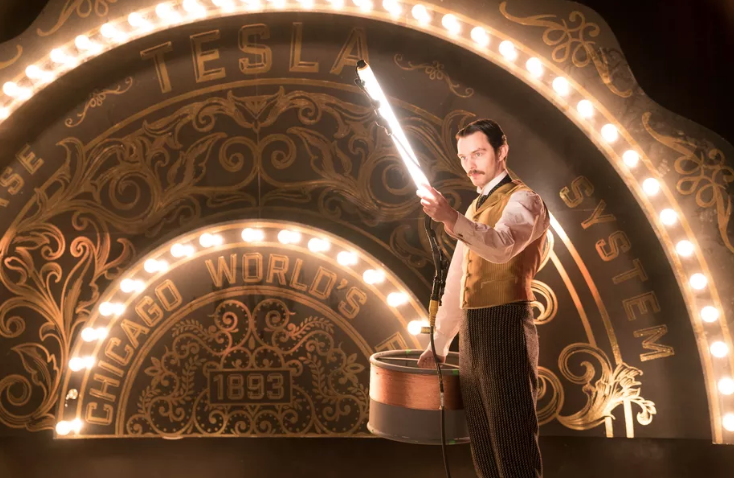Review: The Current War (Director's Cut)
 Sunday, October 27, 2019 at 8:49AM
Sunday, October 27, 2019 at 8:49AM
by Tony Ruggio
 After more than a year of pre-release hell at the scissorhands of Harvey Weinstein and his terrible deeds, The Current War has finally seen the light of day. Tackling the industrial war over electricity between famed inventor Thomas Edison (Benedict Cumberbatch) and business magnate George Westinghouse (Michael Shannon), it’s a good story well told. Well, after a rough first half, anyway. The epic narrative is rushed and contracted in the early going, before evening out and focusing more on character in the final stretch.
After more than a year of pre-release hell at the scissorhands of Harvey Weinstein and his terrible deeds, The Current War has finally seen the light of day. Tackling the industrial war over electricity between famed inventor Thomas Edison (Benedict Cumberbatch) and business magnate George Westinghouse (Michael Shannon), it’s a good story well told. Well, after a rough first half, anyway. The epic narrative is rushed and contracted in the early going, before evening out and focusing more on character in the final stretch.
The breakneck pacing actually does the film a disservice, as we barely get to spend time with Edison, Westinghouse, or their creations before director Alfonso Gomez-Rejon barrels forward to the next moment in history. Classical themes of greed, power, and loss are threaded like any other biopic of powerful men, but the greatest subtext lays therein, where the two men differed so greatly...

Typecast though he is, Cumberbatch is excellent portraying Edison as a genius and mercurial charlatan. He’s full of brilliant ideas and yet so consumed by an insatiable need to secure his name that he inevitably loses his way, committing to lies and loutish behavior in the pursuit of immortality. Of the two, he’s the closest to an antagonist, a man for whom other people are mere tools to further his inventions. That is, except for his long-time assistant and right-hand man Samuel Insull (Tom Holland), and his first wife Mary Stilwell Edison, a woman who died young of “congestion of the brain,” later to be known as a symptom of opiate overdose. When mourning for her or commiserating with Holland’s Insull, we finally get a peek into Edison’s heavily guarded soul.
As rival and default protagonist Westinghouse, Michael Shannon is at his most likable as a man navigating the business world with class, dignity, and good manners. Despite his wealth, he’s a perennial underdog in the face of Edison’s fame, and despite his status, he never loses sight of the right thing to do. He’s the antithesis of every rich-man type, someone attempting to use his money for the good of all, not only himself. Edison is a stubborn intellect who pushes away others with a hand on the levers of power, so naturally Westinghouse is competition. His Alternating Current is cheaper, more efficient, and more practical for delivering electricity to the masses, for beyond the tony brownstones and decadent mansions. While Edison is dreaming and asking of money, money, money, Westinghouse is making money, money, money by looking out for everyone, not only the privileged. It’s difficult to ignore allusions to modern politics when a moral, elite member of upper society is facing off against a famous, natural-born schemer who meddles, lies, and peddles fear in order to win every battle, be it for captain of industry or captivation of the press.
Caught in the middle of these two men, trying and failing to mount his own brand, is young Nikola Tesla (Nicholas Hoult). While clearly the most brilliant and prescient of the trio, he’s an ineffectual businessman, prone to naivete and seclusion in a hotel room he can’t afford. Hoult is a dead-ringer for the iconoclast, donning dapper suits and imbuing the man with that iconic eccentricity and offbeat brilliance we know and love about the legend. He was an inventor, an introvert, and a bit of a socialist, and Hoult makes you believe in all three. Tesla was well ahead of his time or any time, speaking of free electricity in a capitalist world. As in the history books, Tesla’s role is given much less time amid the one-on-one conflict between Edison and Westinghouse. Tesla flitted between employment under the both of them, but he never got his hands dirty or asserted himself as an independent, major competitor in the age of inventors. The Current War is told from the points of view of Edison and Westinghouse, and it needs more of Tesla to cement the alternative, third-party perspective the film is striving for.

Alfonso Gomez-Rejon employs a bag of tricks to enliven the period trappings and true story pitfalls, sometimes to his detriment. There’s an uneasy sense that the filmmakers didn’t trust the material to carry the day and felt the need to use every camera or editing trick in the book to artificially bolster it. The Current War is messy to look at, with odd transitions, dutch angles, and random flourishes and detours into cinema verite-style camerawork. During the first half hour you just wish Gomez would settle down for a minute and stop whipping and cutting so often. It’s relentlessly showy, and inconsistent at that. However, when the board is set, Gomez does settle down and the script explores these characters on a deeper level. There is a conversation between Edison and Westinghouse, their first real meeting, that is a rather sweet and clever distillation of the rivalry and its potential resolution. It’s written in broad strokes, and deftly so, serving as a sneaky metaphor for American division today in our fractured country
Grade: B
Oscar Prospects: Not likely, given competition and the film’s complicated history with the Weinstein Company.
Oscar Deserves: Should garner a nom in Best Costume Design for Tesla’s suits alone.



Reader Comments (1)
I wasn't impressed with the movie, either. It's good that it got to see the light of day, however!
--That was a WEIRD autumn for Hollywood, two years ago, with Louis C.K's movie getting shelved completely and switching out Christopher Plummer for Kevin Spacey in "All the Money in the World".
Tesla was an interesting character, however. Didn't he walk something like ten miles a day?
It was so funny to see the movie, as I'd just seen the Tolkien biopic on a plane a few days before--Nicholas Hoult plays both Tolkien and Tesla.